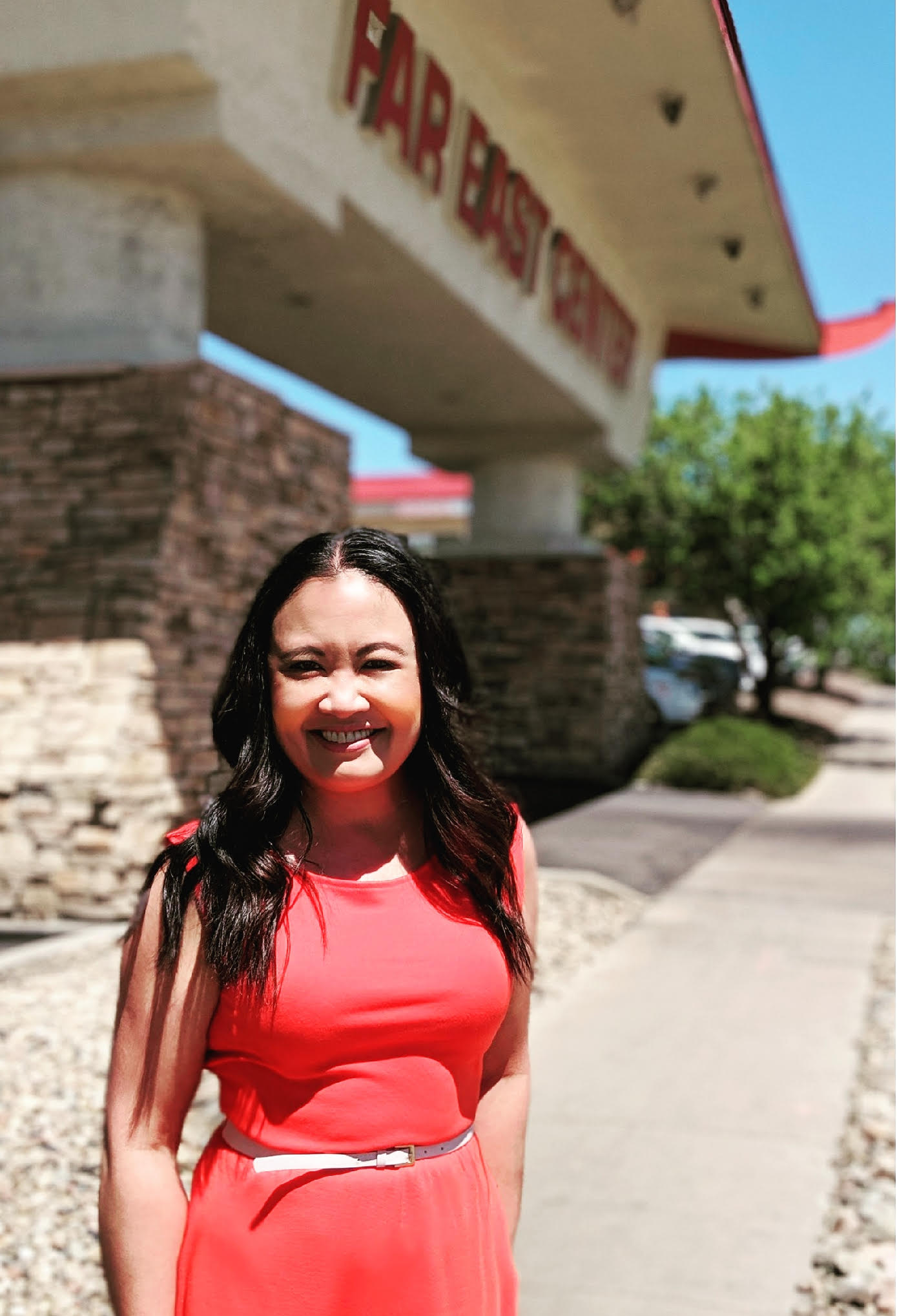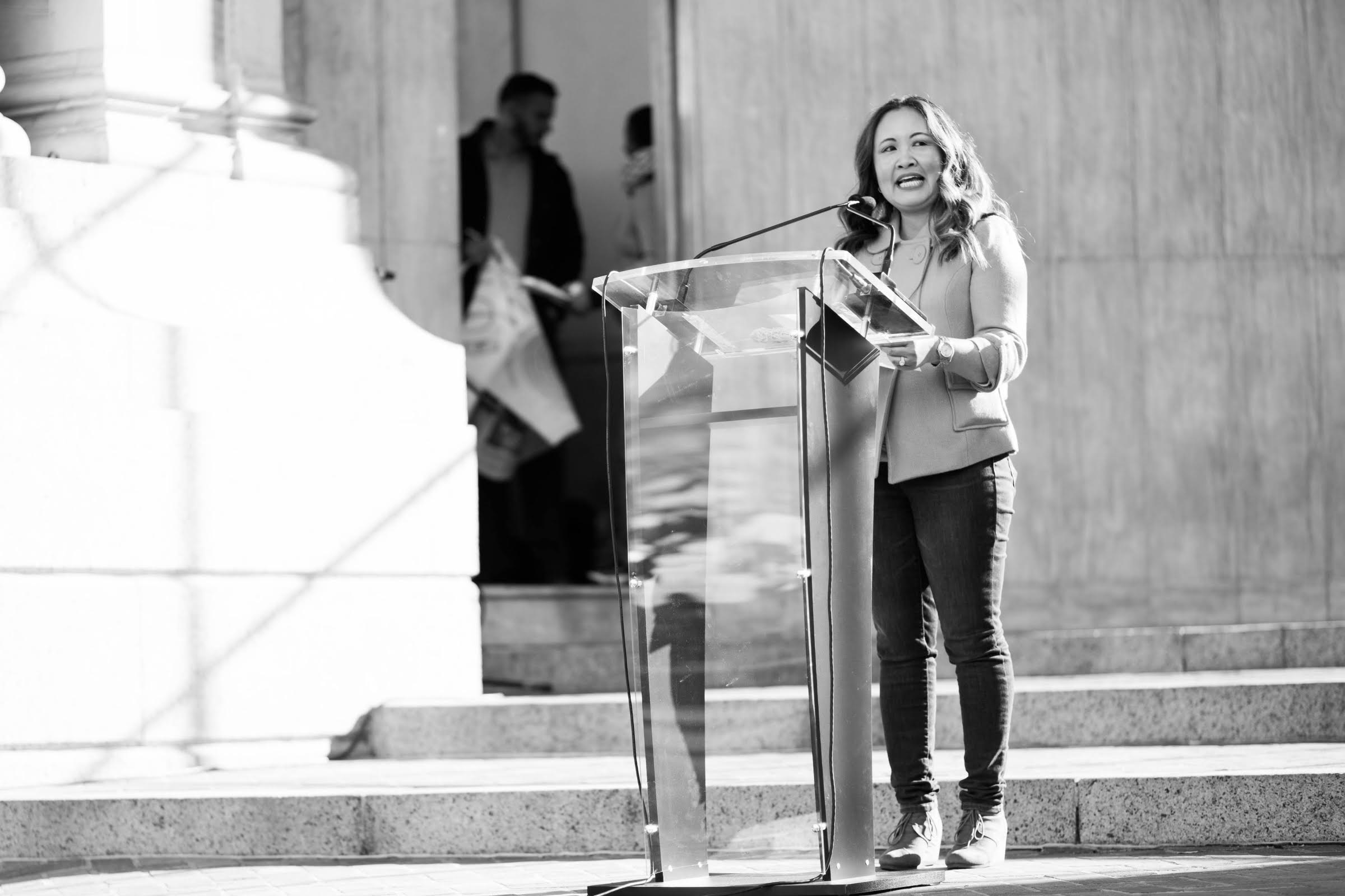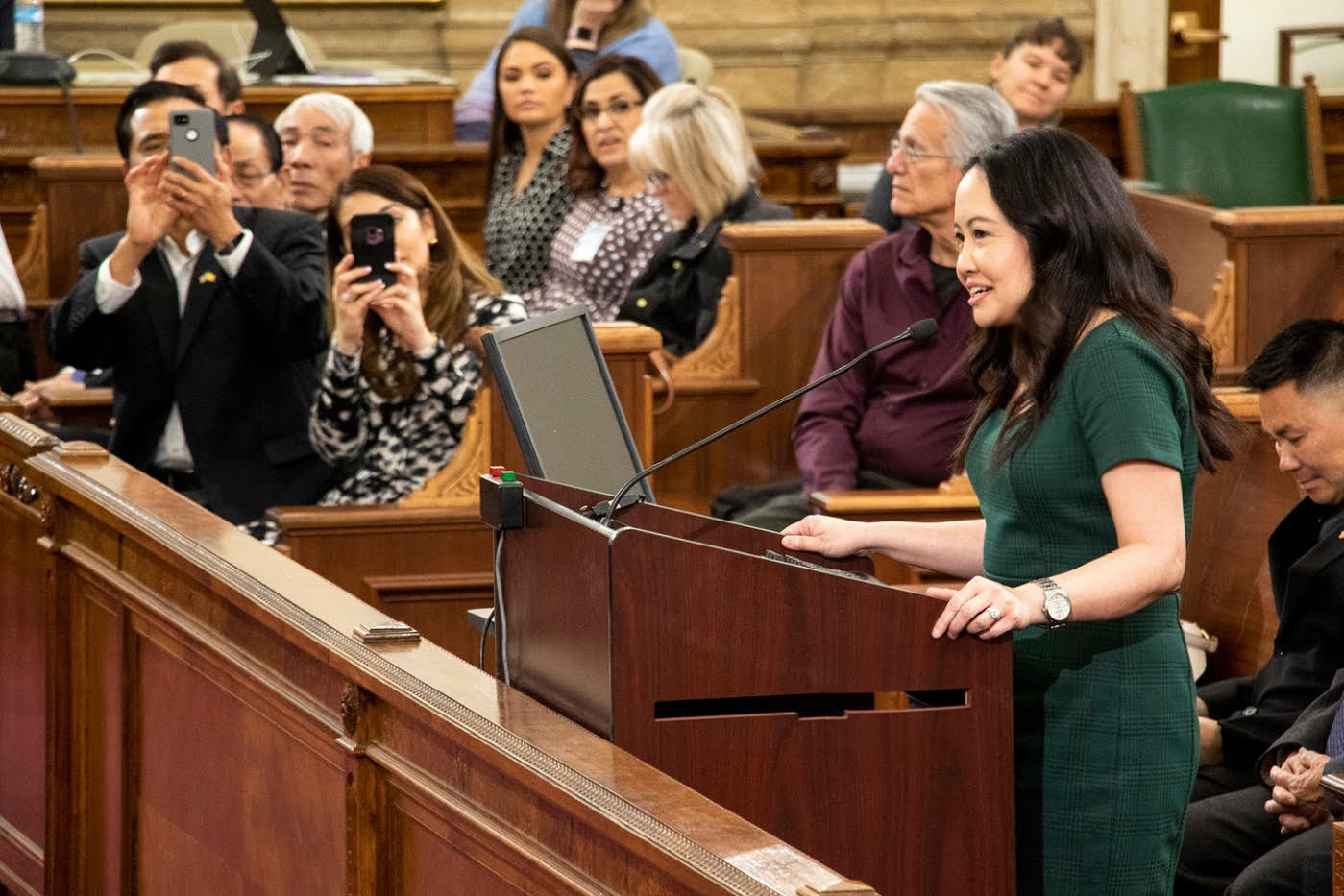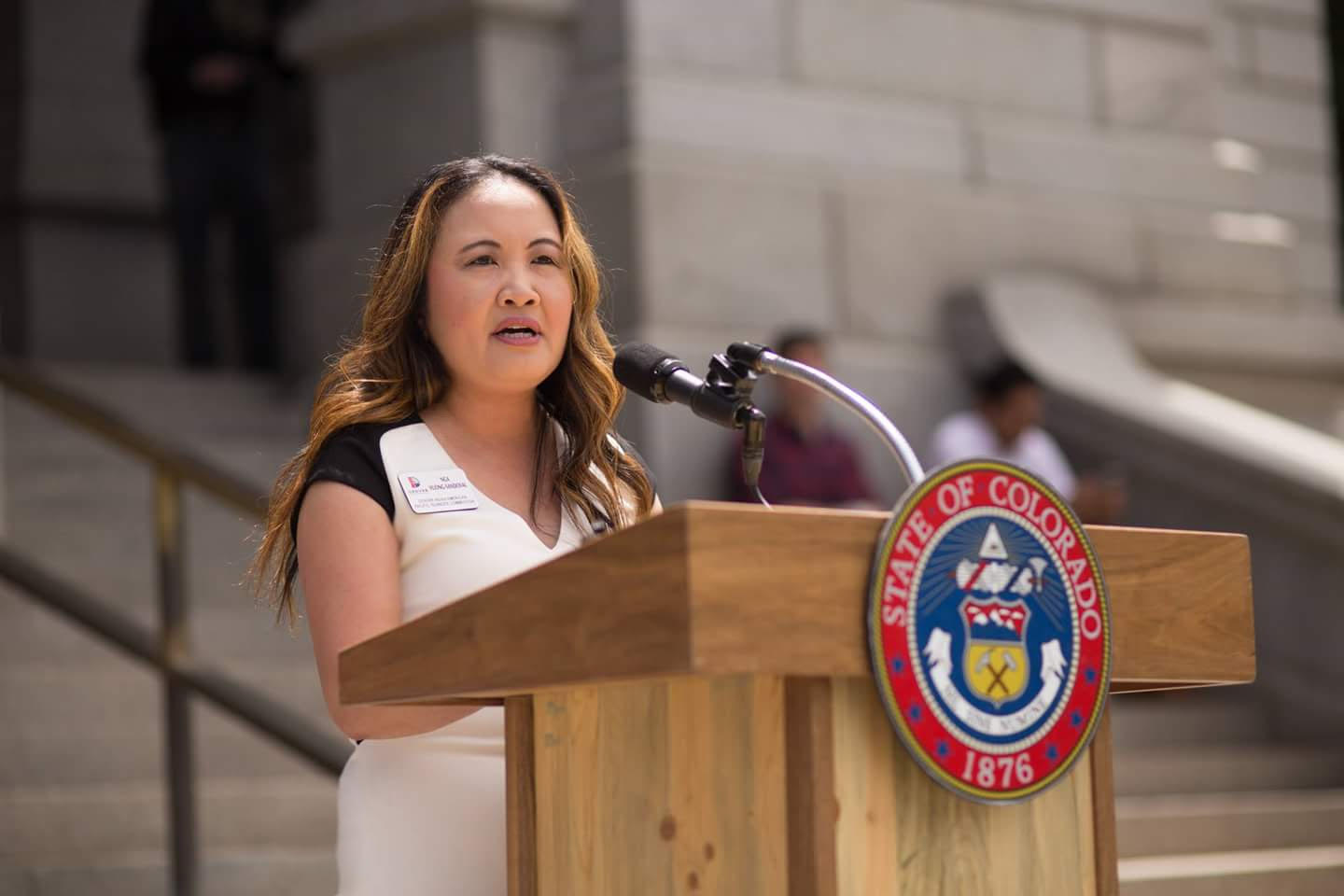Story
Nga Vuong-Sandoval: Refugee, Activist, Historic Preservationist, and Advocate for Colorado’s Refugees
(14 minute read)
Today, Colorado is home to some 24,000 Vietnamese American residents, many of them living in Denver’s metropolitan area. Although most Denverites are well aware of the presence of this community, many know little about the history behind the city’s ethnic Vietnamese population.
When Sài Gòn fell to the North Vietnamese in the spring of 1975, there was a mass exodus of refugees from the South. Between 1975 and 1992, over two million Vietnamese fled the country and nearly a million arrived in the United States. By 1990, Colorado was home to about 5,800 Vietnamese refugees.
Despite the myriad contributions that Vietnamese refugees have made to the city, their history in Denver remains largely unknown to the general public. My interview with Nga Vuong-Sandoval highlights this history.
Nga and her family came to the United States as refugees in the late 1970s. Today, she is involved with numerous organizations dedicated to refugee resettlement and historic as well as cultural preservation in Colorado. She serves as an advisory member on the Little Sài Gòn Redevelopment Project and is a public speaker on the Colorado Refugee Speakers Bureau. She is also the first refugee to be elected to the Board of Directors for the Lutheran Family Services Rocky Mountains, a nonprofit that offers adoption, foster care, older adult caregiver, and refugee services throughout the Rocky Mountain region.
With her diverse experiences—both professional and personal—Nga offered to shed light on her family’s past, her work in historic preservation, and her ongoing efforts to assist and advocate for refugees in Colorado.
When did you and your family arrive in the United States?
My family and I arrived in the late ’70s after the Viêt Nam War. There was great turmoil leading up to this tragic event and the crisis was looming throughout the country. Despite this dire situation, my family wanted to stay hopeful during this horrific period. No one imagines that a situation could become so horrible to the point that you’re forced to flee from your home. I don’t think anybody ever imagined that in their wildest dreams. As the date the Fall of Sài Gòn neared, there were many Vietnamese who refused to leave because Viêt Nam was all that they and their families had known. That was all that was familiar to them and their families. Who would risk everything, not knowing what tomorrow would bring, how long the terror will persist, or if we could ever return home? While there was another segment of the community that knew that it was no longer safe for them, our family decided to flee.
Tanks were rolling in, bombs were dropping, and in certain areas of town there were corpses lying on the streets. There was complete chaos and mayhem. There were some individuals who rushed to the American Embassy in hopes of boarding onto one of the few helicopters available. For other families, they had connections to the military. This allowed them the option of leaving by helicopter or plane, which included only a minute group. For the remainder of us, our only option was to travel by boat. We didn’t have the luxury of deliberating to think twice about what options we had or could have had. We fled because that was our only option and we wanted to give ourselves a chance to live.
You were very young when you left Viêt Nam. Do you have any memories of this?
Fortunately, I have recollections of what occurred, as I have vivid memories of my childhood. We ended up boarding cargo ships which weren’t meant for passengers and were specifically designed for transporting heavy cargo. So, we didn’t have accommodations—such as seating, food, or other basic needs.
We made our journey by boat, and during the course of our treacherous voyage, 200,000 to 400,000 Vietnamese refugees died at sea and their bodies were disposed of from the ships. And during that course there were sea pirates that had attacked many of the ships that were trying to make it to safety. Fortunately, these attacks didn’t occur on our boat. We only brought our most prized possessions, including children, valuables, and photos. There wasn’t room left to bring much else when we’re fleeing for our lives.
We were eventually transferred from the Vietnamese cargo ship to a larger American naval ship that transported us to Guam, where we stayed until the resettlement camps were constructed by the U.S. military. Many people are surprised and don’t realize that there were refugee camps in this country.
The U.S. refugee camps were constructed for the huge diaspora of Vietnamese refugees. Thus, when we were transferred to Arkansas—it was a makeshift situation. The U.S. military had never seen this tremendous amount of refugees before, as we were the first group to arrive. It was an abrupt overnight endeavor that had to be completed immediately. We lived in tents for months until we were assigned to an American sponsor family, as that was the customary process then. Today, the refugee resettlement process has changed. The duration in which refugees remain on refugee camps is significantly longer. Some refugees remain for ten to twenty years on a refugee camp. Imagine trying to make a life for yourself and your family in a tent with little or no basic essentials.
And you found a family sponsor in Colorado?
We had a couple of different stops before Colorado. At the time, refugee families were connected with faith-based organizations. American families who were interested in hosting a refugee or a refugee family were asked to sponsor Vietnamese families and we were provided with a federal stipend to cover our expenses to ensure that our basic needs were met. That’s how we were assigned to our sponsor in Alabama. That was completed through a church organization. We resided there for a while and eventually we moved to the same state as my grandmother and her sponsor family, which was here in Colorado.
The resettlement organization was a Lutheran faith organization that was located in Colorado Springs. Moving to Colorado was our best option in order to keep our family and extended family intact. Keeping families together wasn’t an option for many other refugees, since the destination of where each family would move to was decided for them. My parents tried to maintain some normalcy by trying to keep our family together. Family and intangible items became especially important after we’d lost everything.
So, you were about three years old when you arrived. What are some early memories you have about starting over in a new country?
I recall starting grade school and not being able to communicate a word of English, which is common for many newcomers. I remember experiencing absolute fear because I couldn’t communicate what I wanted to say to others. Many people don’t realize how important language is or the difficulty of connecting with others without language. Imagine how frustrating that can be as a child or even as an adult and not being able to communicate.
Fortunately for me, I arrived in the U.S. when I was a toddler. For adults, I believe that the transition is far more difficult because they’ve already established their lives in their home country. For me, I learned and became proficient with English quickly. One of my earliest childhood memories was of my first-grade teacher, Sister Hilary.
I can only imagine what she was thinking when Vietnamese refugees like me initially arrived—this large diaspora of refugees. Despite our cultural, language, and ethnic differences, she always made me feel welcome. Within months, I became proficient in English and shortly after that she bestowed me with the most prestigious award as a first grader, the Student of the Month Award. To this day, I still have this photo along with her handwritten message and it just demonstrates that she saw the humanity and value to refugees and in me. She made me feel welcome, accepted, and included. I believe her actions were key factors to help refugees feel welcome and included as part of the community.
I later found out more about her when, as an adult, I discovered that she was even more extraordinary than I even realized. She had served in orphanages before she taught grade school and has an endless list of accomplishments. When she retired, she worked at a senior center, although she was a senior herself.
I believe that she was one of the first pioneers who assisted refugees. She also assisted immigrant women in New Mexico before most Americans had begun discussing immigrants. My reason for showcasing Sister Hilary and her work with refugees like me is to illustrate how compassion and treating those different from us as humans has a profound and enduring impact that lasts a lifetime. I’m indebted to her for her humanity and kindnessI truly believe that it was individuals who treated my family and me as humans that became most significant and memorable as a refugee.
How have your experiences and your family’s experience informed your career in social justice, law, and historic preservation?
My areas of emphasis during my undergraduate and graduate studies were political science and criminal justice. I believe that my advocacy work is directly impacted by my personal experience in conjunction with the increasing xenophobia that I witnessed that was targeted at marginalized communities including refugees and immigrants. The more engaged that I became with the community the more I witnessed people who were underrepresented or marginalized being a scapegoat of xenophobia and hatred for the personal shortcomings, downfalls, and racist views of others. Our refugee community is an easy target to place blame, as our country of origin, appearance, language, culture, and our faith are different from the dominant society. Instead of reflecting inward at their own deficiencies, it’s easier for others to blame refugees for their own woes and discontent. It’s easier to bully the vulnerable, but it’s more challenging to assess oneself and look inward to see why we hold destructive and counterproductive views.
Although we had lost everything including our homeland, our home, and all that was familiar to us, we were greeted by a portion of the population as being less human and unworthy of being in the U.S. I recall that protesters were yelling at us while we lived in refugee camps. They were holding signs that read, “Gooks, go back to where you belong! We don’t want you here! We don’t want any more Chinese!” I keep witnessing a recycling of hatred and xenophobia; I could no longer sit on the sidelines. I feel obligated and compelled as someone who has gone through the refugee experience firsthand. I see humans being dehumanized and that’s the reason I began raising my voice. I started advocating in various methods including speaking in large gatherings like Colorado World Refugee Day and the Womxn’s March. I’ve also published book reviews in the Oxford University Press, specifically on refugees to ensure that our refugee perspective is represented in academic textbooks.
I became the first refugee board member at Lutheran Family Services Rocky Mountains, which is the same faith that had welcomed in my family. I now have a seat at the table in order to make decisions that are meaningful and represent our refugee perspective, rather than through the viewpoint of a compassionate supporter There’s something profoundly meaningful when I’m able to provide my refugee perspective so that we can even more effectively assist the community that we’re serving.
I became involved with the Denver’s Little Sài Gòn Business District Redevelopment Project due to my passion and desire to preserve our history, legacy, and culture. This neighborhood was the first landmark in Colorado to celebrate entrepreneurship and heritage for my Vietnamese community. When you learn about someone’s culture through food, it’s meaningful because now you have a shared interest and food serves to connect people in meaningful ways.
I believe that humans are naturally inclined to become creative when we’re placed in difficult situations. I believe that’s where most of the inventiveness derives from—when we’re forced into an uncomfortable scenario. Many refugees are forced to become entrepreneurs because we were initially denied employment, bank loans, and other opportunities due to discrimination and racism. Refugees become resourceful by establishing our own communities, which is one of the driving forces behind the development of Denver’s Little Sài Gòn Business District.
I also serve on the Denver Election Advisory Committee to represent our Asian-American Pacific Islanders, refugees, and immigrant communities. My objectives are to increase voter and civic participation in order to represent who we are and to make our voices heard as a community.
I’m honored and proud to serve as a Noble Ambassador for the Christina Noble Children’s Foundation that was founded and established by an extraordinary woman who was an orphan herself, who has undergone tremendous adversity. For over thirty years, this foundation has served underserved and underprivileged children in Viêt Nam and Mongolia who are impacted by the effects of the Viêt Nam War, specifically the deadly biochemical Agent Orange that remains in the ecosystem to this day.
What other important things would you like to share?
Preserving history in the context of culture is significant, because I believe that some folks only equate this concept to tangible objects when there are a myriad of intangible things directly connected with cultural and historical preservation. As a refugee, language becomes extremely important in preserving culture. Thus, for me what becomes even more important are the things that are intangible, which includes language and culture. In the U.S., assimilation is encouraged and valued. However, I believe that multiculturalism serves to integrate one’s new language and culture while also preserving our culture and history from our homeland. Multiculturalism allows refugees to be our authentic selves by preserving our identity and history combined with incorporating other cultures.
I serve as public speaker for the Colorado Refugee Speakers Bureau. This organization was founded in 2016 as a way to showcase refugee voices to ensure that our voices are represented and heard directly from us speaking about our personal experiences and perspectives as refugees. It’s a way for refugees to reach out to the community and to also hear from the community who may have questions for refugees. Some people have never met a refugee and have only heard about us through third parties. We want to have meaningful interactions with community members. It’s important that people see how unique every single one of our stories is and also the common thread that we all share, despite the fact that we come from different continents, different countries, and different cultures.
The refugee speakers on the Colorado Refugee Speakers Bureau are family to me, whether they’re from Sudan, Iraq, Iran, Bosnia, Somalia, or Ethiopia. We have a shared understanding of the importance of sharing our narratives because we want our truth to be told directly by us. It’s the best way to ensure that our message isn’t diluted, sanitized, or misrepresented. Our stories speak our own truth, and storytelling is a powerful mechanism to disseminate our refugee stories. We want individuals to see that we’re accessible on refugee issues that they may want to learn more about but have been hesitant to ask or haven’t had that opportunity to hear us speak.
The more that individuals know about refugees, the more obligation they hold to share what they’ve heard. Refugee supporters should be our ambassadors by sharing our stories with those who may not agree with us. I believe that they should educate and inform others on the importance of supporting refugees because that’s exactly the community that needs to hear our stories. Ultimately, the responsibility should fall on all of us because refugees are unable to accomplish this alone. We need the support of everyone who realizes the value of refugees as individuals and as a community.
I wholeheartedly believe that by telling our stories and advocating for our community we’re able to have meaningful dialogues. In turn, individuals could support us in ways that are personal and meaningful to them and not just by supporting us through words. To make a genuine and impactful difference, support needs to translate into meaningful action—whether volunteering, inviting a refugee for a meal, donating to their favorite local or an international organization that provides services for resettlement for newcomers, or by retelling our stories. I believe that storytelling and advocating through action is a powerful way to connect with people. Advocating also ensures that our stories are heard in the most honest and authentic way.
For more, see Nghia M. Vo, The Vietnamese Boat People, 1954 and 1975–1992 (Jefferson, N.C.: McFarland & Company, Inc., Publishers, 2006), 183.




